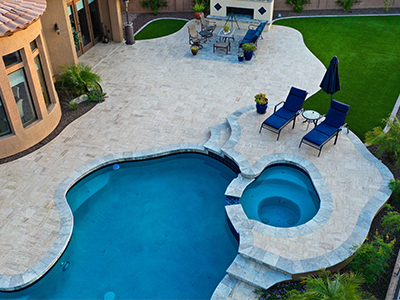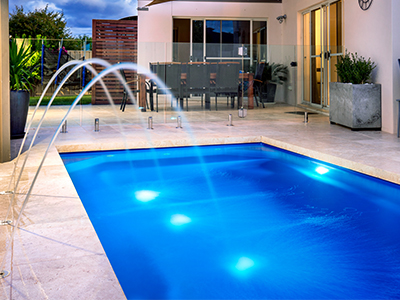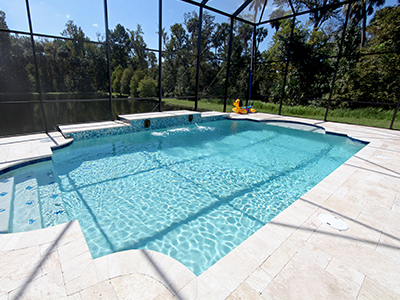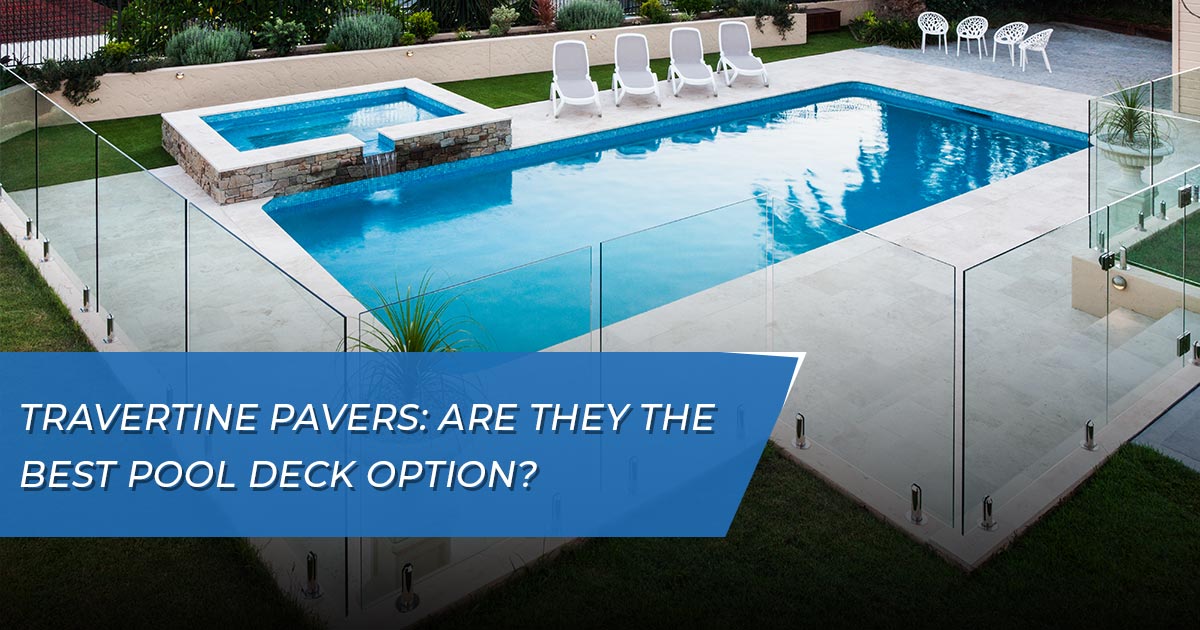Travertine Pavers: Are They the Best Pool Deck Option?
When designing and installing a new pool, it’s natural to focus on all the “exciting” parts of the process. Picking out size, shape, and even a location in your yard is fun – to the point in which selecting pavers for your new pool deck can sometimes feel like an afterthought. After all, one type of material is just as good as any other, right?
Wrong.
Remember that a pool deck is an area that will often come under heavy use. It needs to be durable, functional, safe, and visually attractive – all at the exact same time. Some people choose to go with one of the most traditional options available: concrete. However, there is one type of material out there that is absolutely worth considering to really create the type of environment that you’re after:
Travertine.
Indeed, travertine pavers have become popular over the last few years, in particular, for good reason: As a natural stone, travertine pavers bring with them a wide range of different benefits, all of which are more than worth a closer look.
Related Article: Pool Decking Options for Your Renovation Project
The Advantages of Travertine for a Pool Deck: Breaking Things Down
 One of the qualities that makes travertine so unique is that it is a natural type of stone. Think of it as something more akin to granite or marble than other types of material. It develops naturally in our environment around specific types of mineral deposits, making it one of the more unique (not to mention aesthetically pleasing) types of limestone there is.
One of the qualities that makes travertine so unique is that it is a natural type of stone. Think of it as something more akin to granite or marble than other types of material. It develops naturally in our environment around specific types of mineral deposits, making it one of the more unique (not to mention aesthetically pleasing) types of limestone there is.
Because of their natural beauty and distinct visual appearance when compared to other types of materials, they’re often used, not just for pool decks but also for pathways and other types of outdoor areas. Rather than allowing your pavers to become an afterthought, travertine can command the attention of visitors in a way that allows these areas to become a legitimate focal point.
Travertine pavers are also heavily customizable. They’re available in a plethora of different shapes for you to choose from, depending on what type of look you’re going with in your outdoor environment. When working with a contractor like those at GPS Pools, who make an effort to understand what your goals are, this is a great opportunity to have your travertine pavers look like they were purposefully selected for your pool deck.
You can also get your travertine pavers in a variety of different textures, including brushed, chiseled, filled, honed, tumbled, and more. Your contractor will work with you to determine which texture makes the most sense for your own property.
To that end, travertine pavers have long been considered to be one of the “luxury” options when it comes to putting together a pool deck. Yes, that means they’re likely more expensive, and part of that has to do with the fact that installation is far more difficult than it would be with something like concrete. But oftentimes people find that the end result is more than worth it, particularly when they see what travertine does to the resale value of their home.
While travertine does have some considerations that you need to make in terms of maintenance (as will outdoor materials), it also has advantages in terms of durability that other options don’t. For example, if you live in an area of the country with all four seasons, you’ll be pleased to note that travertine is highly resistant to freeze-thaw cycles. These cycles could cause other materials to expand and contract to the point that they begin to crack and break, but this isn’t the case with travertine.
None of this is to say that travertine is without its disadvantages. There aren’t as many color or design options as there are with other types of materials, for example. But most people don’t mind this because part what you’re paying for is that distinct visual style that only travertine will have. Therefore, anything that varies from that likely wouldn’t be ideal in the first place given your goals for your pool deck.
Finally, because travertine is a natural form of stone, the pavers themselves are one of the more environmentally friendly options that you can select for your pool deck. Travertine, which is found near the surface of the Earth, is a non-toxic form of stone, making it the perfect choice for people who want to “go green” wherever they can.
Related article: Travertine vs Brick Pavers for Your Pool Deck
Routine Maintenance of Travertine Pool Decks
 As stated, travertine pool decks are known for their high durability, but that doesn’t necessarily mean that they are totally maintenance-free. With the proper care, they can look their best for literally decades, but you will have to keep a few things in mind to get to that point.
As stated, travertine pool decks are known for their high durability, but that doesn’t necessarily mean that they are totally maintenance-free. With the proper care, they can look their best for literally decades, but you will have to keep a few things in mind to get to that point.
In addition to the previously mentioned best practices like resealing your pavers every so often, you’ll also want to sweep your travertine pool deck on a regular basis – preferably after each use. This will help prevent issues related to staining from things like dust, dirt, pool chemicals, and more.
You’ll also want to pay close attention to the condition of your travertine pavers. If you see any small problems develop that are a result of prolonged exposure to the sun, rain, or other elements (like cracks developing around the edges of the pavers, for example), you’ll want to address them sooner rather than later before they get worse.
Should one or more of your travertine pavers develop an issue that is too severe to repair, don’t worry – they’re also easy to replace as well. All you’ll need to do is engage with a service professional, and they’ll be able to swap the old paver out and put a new one in that matches perfectly with the rest of your pool deck. You don’t have to worry about any long-term damage that you won’t be able to adequately address.
Frequently Asked Questions About Travertine Pavers
What follows is a list of some of the most common questions that people have when it comes to selecting travertine pavers as the basis for their new pool deck.
Is travertine more expensive than pavers?
Generally speaking, travertine will be more expensive than traditional concrete pavers when it comes to the completion of your project. This is because travertine is a natural stone, meaning that it isn’t as readily available as concrete would be. However, you also have to consider the fact that travertine will likely increase the resale value of your home over concrete, thus making it an investment with significant long-term benefits.
Can you pressure wash travertine pavers?
Yes, travertine pavers can absolutely be pressure washed – as long as you do so lightly. Pressure washing travertine isn’t necessarily the same as pressure washing something like a deck or vinyl siding on a house. You need to use a pressure washer that contains a “light” setting, or, if you don’t have one of your own, hire a professional service provider who does.
Should travertine pavers be sealed?
Yes, it is always a good idea to properly seal your pavers after installation. Even though they are porous and thus naturally slip resistant, the types of chemicals that are used to clean the water in your pool could potentially cause staining if you’re not careful. Therefore, sealing your travertine is always recommended to avoid these types of problems moving forward.
Do travertine pavers crack easily?
One of the unfortunate downsides of travertine is that it is susceptible to cracking and chipping under heavy use. This is why you always need to be careful when moving things like furniture around your pool deck area, and you should also repair any issues as you notice them to stop a small problem now before it has a chance to become a much bigger (and potentially more expensive) one down the road.
How long does outdoor travertine last?
Travertine contains certain calcified materials that make it very durable and long-lasting, especially when compared to alternative paver options you may be exploring. Yes, issues like chipping or cracking can occur as outlined above, but they can also be taken care of quickly. With the proper care, travertine can last for 100 or more years.
Can you install travertine over concrete?
If you already have a space with concrete pavers around your pool deck, you’ll be pleased to know that you can install travertine on top of them – the same as you can any other type of paver. The process for doing this is called mud-set, also commonly referred to as wet-set. This doesn’t make the installation process any easier, but it can be done if the situation calls for it.
Why is my travertine turning green?
If your travertine pavers are turning green, this is likely caused by staining, which happens due to the types of chemicals used to clean a pool. To avoid this, make sure your pool is properly sealed (and re-sealed on a regular basis).
Are there different grades of travertine pavers?
 Yes, there are three different grades of travertine that homeowners can choose from, depending on their needs. The first is referred to as “Premium,” which involves pavers that have been perfectly cut and also have identical thicknesses at all points. “Premium” travertine has very little in the way of filler material.
Yes, there are three different grades of travertine that homeowners can choose from, depending on their needs. The first is referred to as “Premium,” which involves pavers that have been perfectly cut and also have identical thicknesses at all points. “Premium” travertine has very little in the way of filler material.
The next is called “Standard” grade. These pavers are often carefully chosen by the crew who will be doing the installation and are known for the fact that they have a consistent color throughout each one. When it comes to durability, they are roughly the same as “Premium” pavers.
The final grade is called “Commercial.” Here, one paver may look very different from the next in terms of color. Commercial travertine pavers are not filled, and the edges may be imperfect (they may have cracks, for example), unlike the other two grades.
How do you maintain outdoor travertine?
At GPS Pools, we have previously written an article about this very topic called “How to Maintain Your Travertine Pool Deck.” In general, you should always reseal your pavers every year or so, and you should pressure wash your pavers at least once per year. Moreover, you should repair any small cracks as they happen to avoid more significant long-term damage.
Does travertine get hot in the sun?
While all materials will get hot on a particularly sunny and warm day during the summer, travertine is actually quite resistant to this phenomenon. Travertine has a very low rate of UV absorption, allowing it to stay cooler for far longer than something like concrete.
Can you acid wash travertine pavers?
No, you should not use acid washing in an attempt to maintain your travertine pavers. This is because travertine is calcium-based, which can have a negative reaction with acid-wash products.
How do you make travertine pavers not slippery?
The good news is that travertine by its very nature is not as slippery around an area like a pool deck as other materials might be. This is because travertine is porous, which makes it naturally resistant to things like slippage.
Is Travertine Right for Your Deck?
At GPS Pools, we always recommend travertine pavers to our customers for many reasons, including those outlined above. A pool is nothing if not an investment, and it’s one that deserves to be protected. Travertine is easy to repair if necessary, even easier to periodically reseal, and will last for decades with the right maintenance regimen.
It’s resistant to slippage, dries quickly, and is arguably the most visually pleasing option there is for a pool deck – truly a best case scenario in every sense of the term.
When working with a GPS Pools contractor, we can also help determine any custom size requirements for your travertine pavers that you may need given the environment that you’re working with. Regardless of whether you’re adding an entirely new pool deck or you want to add travertine to your existing one, our team has the experience in pool deck resurfacing and remodeling services necessary to get the job done – no matter what.

